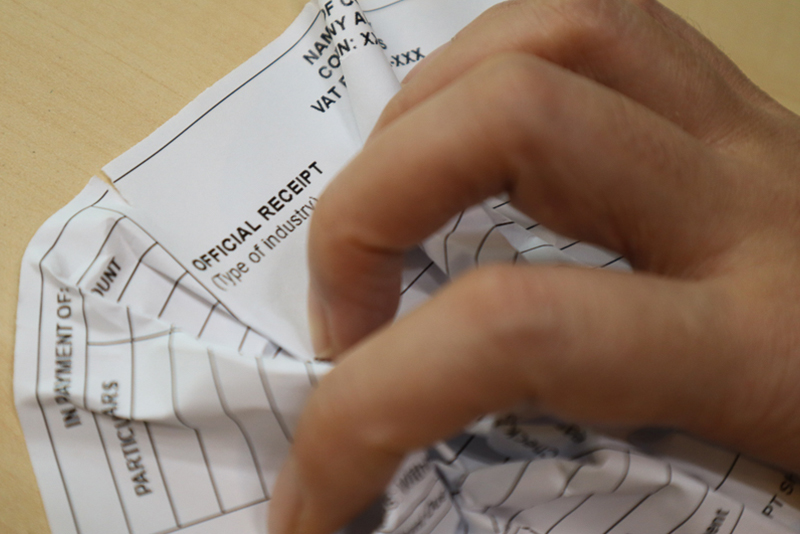
Official Receipts: Never “Fake It Until You Make It”
By: Atty. Jomel N. Manaig
"While the unraveling of the fake receipt scheme is a cautionary tale for everyone, it does not mean that honest taxpayers can just rest on their laurels and not learn anything from this."
 Atty. Jomel N. Manaig +632 8403-2001 loc. 140 |
One of the biggest tax-related news of recent vintage is the explosive revelation that “ghost” companies manufacture fake receipts which some taxpayers purchase to pad up their respective deductible expenses and input tax credits. The latest estimate from the BIR puts the tax loss to 50 Billion Pesos. For emphasis, that is a number 5 with 10 zeroes. That is a lot of zeroes!
 So far, the fallout of the scheme includes the revocation of the accreditation of a certified public accountant involved, the filing of criminal complaints against four ghost corporations linked to the alleged sale of fake receipts, and the estimated loss of 50 Billion Pesos from the coffers of the government. We just cannot let that amount go, can we?
So far, the fallout of the scheme includes the revocation of the accreditation of a certified public accountant involved, the filing of criminal complaints against four ghost corporations linked to the alleged sale of fake receipts, and the estimated loss of 50 Billion Pesos from the coffers of the government. We just cannot let that amount go, can we?
At the heart of this scheme are official receipts (and invoices, for that matter) issued by ghost corporations to taxpayer-collaborators representing non-existent transactions. But how do fake official receipts exactly affect tax collection?
These fake receipts primarily affect collection of income taxes and value-added taxes. Under the Tax Code, official receipts are used to substantiate deductions from gross income. The existence of these fake receipts allow taxpayer-collaborators to claim additional expenses which reduce the taxable income. In turn, the reduced taxable income lowers the tax base of the taxpayer-collaborators for the imposition of income tax.
On the other hand, these fake receipts also affect value-added tax collection by enabling the taxpayer-collaborators to claim input taxes. The input taxes are then used to offset against output taxes which lowers the value-added tax liabilities of the taxpayer-collaborators.
This is tax evasion. Plain and simple. It was good that this scheme was brought to light and that the authorities are moving in to pull the plug.
While the unraveling of the fake receipt scheme is a cautionary tale for everyone, it does not mean that honest taxpayers can just rest on their laurels and not learn anything from this.
Even with legitimate official receipts, taxpayers must still be wary of the requirements to keep these valid for tax purposes. The Tax Code requires specific information to be indicated in an official receipt and/or invoice for it to be a valid source of input tax. Non-compliance with these invoicing requirements would result in the disallowance of the expenses and input taxes covered by the non-compliant official receipt and/or invoice.
Taxpayers must exert effort to ensure compliance with the invoicing requirements. Sufficient remedial measures must be undertaken to correct non-compliant official receipts and/or invoices.
It should be noted, though, that the realities of business in the country do not always reflect what is prescribed under the law. In the fake receipt scheme, there is an official receipt issued for an inexistent transaction. However, despite the Tax Code requiring substantiation of expenses, there are legitimate business transactions wherein an official receipt or invoice is not customarily issued.
The reason behind the non-issuance of the official receipt or invoice is beside the point. In a case decided by the Supreme Court, it was categorically held that the proper substantiation requirement for an expense to be allowed is the official receipt or invoice. As such, despite the reason for the non-issuance and the existence of other accounting records, if any, corroborating the said legitimate transaction, the taxpayer claiming the expense must still endeavor to secure and present the related official receipt or invoice.
Just to round up our short discussion on official receipts and invoices, let us not forget the following important related matters: (1) the BIR recently removed the 5-year limit on the validity of official receipts and/or invoices; (2) the retention period for the original copies of accounting records, including official receipts and/or invoices, is 5 years and only its electronic format in the succeeding 5 years; and (3) the BIR is pursuing its Electronic Invoicing System for select categories of taxpayers.
Official receipts represent a key element in everyday business transactions. Taxpayers must take considerable steps to ensure that their transactions are duly supported by official receipts and that these comply with the invoicing requirements. Let us be responsible and law-abiding members of society. Lest we face the consequences when the hammer falls.
The author is a junior partner of Du-Baladad and Associates Law Offices (BDB Law), a member-firm of WTS Global.
The article is for general information only and is not intended, nor should be construed as a substitute for tax, legal or financial advice on any specific matter. Applicability of this article to any actual or particular tax or legal issue should be supported therefore by a professional study or advice. If you have any comments or questions concerning the article, you may e-mail the author at This email address is being protected from spambots. You need JavaScript enabled to view it. or call 8403-2001 local 380.




